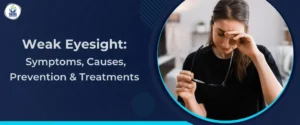The very thought of getting an injection in your eye can be intimidating. However, for many patients with vision-threatening eye conditions, eye injections are one of the safest and most effective ways to protect and restore vision. This is the reason these treatments have now become a routine part of modern eye care.
What are Eye Injections?
Eye injections or intravitreal injections are shots that administer medicine directly into the eyeball – right where it is needed. They can treat eye conditions, like age-related macular degeneration (AMD), diabetic retinopathy, macular edema, and retinal vein occlusion.
Given their efficacy, they are a preferred treatment to improve vision and save sight in some serious eye conditions that can potentially lead to loss of vision. Traditional oral or topical medications may not reach the back of the eye in effective concentrations, which is why eye injections are so valuable.
Anti-VEGF (Vascular Endothelial Growth Factor) injections and IVTA (Intravitreal Triamcinolone Acetonide) injections are the most common types of eye injections.
Why Are Eye Injections Needed?
Some eye diseases can lead to growth of abnormal blood vessels or swelling inside the eye. This can damage the retina (the light-sensitive tissue at the back of the eye – responsible for clear vision), resulting in significant loss of vision or even blindness.
Such eye conditions include age-related macular degeneration (AMD), diabetic eye disease, macular edema, severe eye inflammation (uveitis), and retinal vein occlusion. To treat these eye diseases, medications have to be directly administered in the eye. It helps stop bleeding, reduce swelling, and prevent further vision loss. By targeting the root cause directly inside the eye, these treatments work more effectively than tablets or drops.
Anti-VEGF (Vascular Endothelial Growth Factor) Eye Injections
Growth of abnormal blood vessels in the eye is the reason behind several vision-threatening eye conditions. Anti-VEGF injections aim at stopping the growth of these abnormal blood vessels in the eye. They help treat:
| Disease | Explanation |
| Age-Related Macular Degeneration (AMD) | – A major cause of vision loss in the elderly – Causes the macula to deteriorate, typically because of abnormal blood vessel growth |
| Diabetic Retinopathy | – Occurs due to high blood sugar levels – Retina’s blood vessels get damaged – Result is leakage and swelling in the eye |
| Retinal Vein Occlusion (RVO) | – Caused by abnormal blood vessel growth – Can lead to blindness |
Advantages of Anti-VEGF Injections
- Prevent vision loss – By halting the growth of abnormal blood vessels in the retina
- Proven effectiveness – Research shows that AMD, diabetic retinopathy, and other conditions can be successfully treated with anti-VEGF injections
- Minimally invasive – As compared to surgical options
IVTA (Intravitreal Triamcinolone Acetonide) Eye Injections
IVTA are steroid-based shots to reduce eye inflammation. They help treat:
| Disease | Explanation |
| Diabetic Macular Edema (DME) | – Leaking blood vessels in the eye cause the macula to swell – Happens in diabetics |
| Uveitis | – An inflammatory disease – Affects the middle layer of the eye |
| Retinal Vein Occlusion (RVO) | – Veins in the retina get blocked, causing fluid build up and swelling – Can lead to blindness |
Advantages of IVTA Injections
- Reduce inflammation and swelling in the eye
- Lasting effect that makes them better than other treatments
- Patients experience improved vision
What happens during the procedure?
The phrase ‘eye injection’ may itself sound scary, but the process is quite comfortable. Your eye specialist will numb your eye(s) with anaesthetic eye drops, clean them carefully, and then inject the medicine. It is a matter of just a few seconds.
You may feel slight pressure, but not pain. The doctor will check your eye(s) to ascertain everything is fine. Most patients go home right afterwards. You are fit to resume your normal activities the next day.
What to Expect After Getting an Eye Injection
There may be some irritation in your eyes for a few hours. A spot of blood, known as a subconjunctival haemorrhage, at the site of the injection may also develop. However, it is a rare occurrence and often clears up within 6-7 days.
Fortunately, eye injections do not generally lead to complications. However, do visit your eye specialist should you notice any of the following symptoms:
- Pain or discomfort in the eye
- Difficulty seeing
- Floaters appear in your vision
- Light sensitivity
Recovery and Care Tips
You must abide by your doctor’s guidance after getting an eye injection:
- Do not rub your eyes: It will help prevent infection.
- Use prescribed eye drops: It will help reduce swelling and discomfort.
- Attend follow-up consultations: Regular check-ups by your doctor will help them monitor the effects of the injection and ensure things are fine.
Eye injections, such as Anti-VEGF injections and IVTA (steroid) injections can effectively treat serious eye diseases like diabetic retinopathy, AMD, and macular edema – potentially linked with vision impairment or blindness. The advantages of eye injections outweigh their potential drawbacks. Consult an experienced retina eye specialist at Sohana Eye Hospital to find out the best line of treatment for your eyes.





